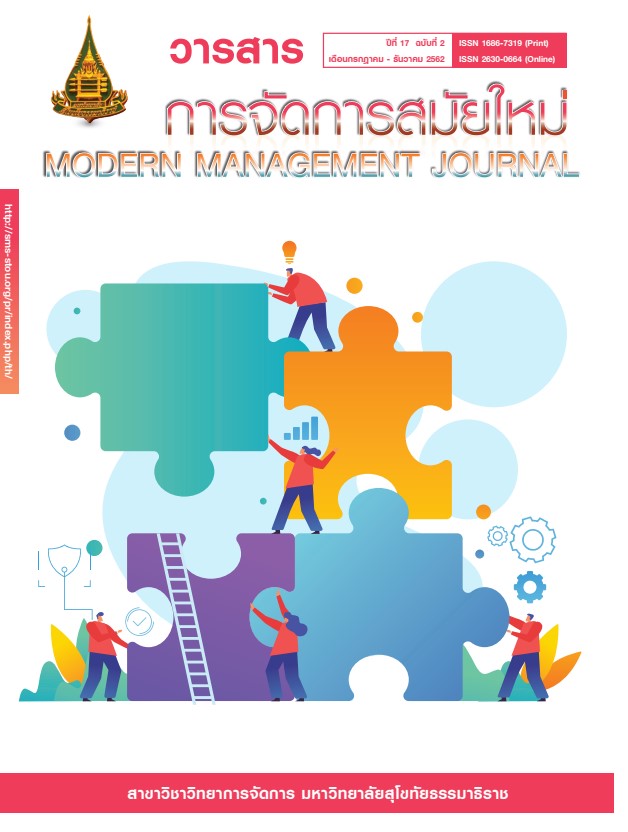AN ANALYSIS OF SERVICE QUALITY FROM FOREIGN TOURIST FEEDBACKS IN USING SPA SERVICES IN BANGKOK
คำสำคัญ:
spa, health tourism, tourist reviewsบทคัดย่อ
Most spa studies were conducted through the primary data by focusing on the questionnaire surveys. However, the spa studies aiming to collect the information from the secondary data source in relation to service quality benefiting are limited. This study, therefore, had the objectives to 1) analyze customer feedback in using spa services in Bangkok through the secondary data and 2) to analyze those feedbacks in relation to the 5 dimensions of service quality. This study collected data from Trip Advisor as a main source of secondary data, and used content analysis to categorize the data as well as the frequency and percentage to simplify the quantitative data.
The results indicated that customer feedbacks can be grouped into 13 major subjects, and categorized into 10 positive and negative themes. With regard to an analysis of service quality dimensions, the study categorized positive customer feedbacks into 5 dimensions based on the frequency analysis, namely: 1) reliability 2) tangibility 3) empathy 4) assurance and 5) responsiveness. Meanwhile, the negative customer feedbacks were also categorized into 1) reliability 2) empathy 3) assurance 4) responsiveness and 5) tangibility. Interestingly, reliability was found to be the most cited dimension from both positive and negative feedbacks. The results of the study will provide the recommendations that benefit the spa business in Bangkok.
เอกสารอ้างอิง
Blair, J. (2017). Standard operating procedures for a spa. Retrieved 2 June 2018, from https://careertrend.com/list- 6831001-standard-operating- procedures-spa.html
Black, H., & Kelley, S. (2009). A storytelling perspective on online customer reviews reporting service failure and recovery. Journal of Travel & Tourism Marketing, 26, 169-179.
Brown, A. (2018). Spa etiquette, Retrieved 2 June 2018, from https://www.tripsavvy.com/ spa-etiquette-guide-3085916
Chieochankitkan, A., & Sukpatch, K. (2014). The Customers’ Perception of Service Quality for Spa Establishments in the Active Beach Tourism Cluster, Thailand. Silpakorn University Journal of Social Sciences, 14(3), 53-75.
Dawson, M., & Titz, K. (2012). Problem-based learning as a strategy to teach service quality: An assessment of on-line reviews. Journal of Hospitality & Tourism Education, 24 (2/3), 67-72.
Department of Health Service Support. (2019). Spa Shop Thailand. Nonthaburi: Ministry of Public Health.
Fernandes, J.V., & Fernandes, F.M. (2013). Health and wellness tourism today. Retrieved 10 January 2018, from http://www.medicaltourismmag.com/health-and-wellness-tourism-today
Han, H., Kiatkawsin, K., Kim, W., & Lee, S. (2017). Investigating customer loyalty formation for wellness spa: Individualism vs. collectivism. International Journal of Hospitality Management, 67, 11-23.
Hashemi, S., Jusoh, J., Kiumarsi, J., & Mohammadi, S. (2015). Influence factors of spa and wellness tourism on revisit intention: The mediating role of international tourist motivation and tourist satisfaction. International Journal Research-Granthaalayah, 3(7), 1-11.
Kiatkawsin,K., & Han, H. (2017). An alternative interpretation of attitude and extension of the value–attitude–behavior hierarchy: the destination attributes of Chiang Mai, Thailand. Asia Pacific Journal of Tourism Research, 22(5), 1-20.
Klaysung, C. (2016). Behaviors and Factors Affecting the Selection of Spa Services among Consumers in Amphawa, Samut Songkhram, Thailand. International Journal of Social and Tourism Sciences, 10(2), 897-901.
Lo, A., Wu, C., & Tsai, H. (2015). The impact of service quality on positive consumption emotion in resort and hotel spa experiences. Journal of Hospitality Marketing & Management, 24, 155-179.
Mak, A. H., Wong, K. K., & Chang, R. C. (2009). Health or self‐ indulgence? The motivations and characteristics of spa‐ goers. International Journal of tourism research, 11(2), 185-199.
Ministry of Public Health. (2014). Health service standards for overseas establishment. Nonthaburi: Ministry of Public Health.
Quintela, J., Costa,C., & Correia,A. (2016). Health, wellness and medical tourism: A conceptual approach. Enlightening Tourism. A Pathmaking Journal, 6(1), 1-18.
Sangpikul, (2018). An analysis of spa tourist reviews in major tourism cities. Modern Management Journal, 16(2), 83-96.
Stara, J., & Peterson, C. (2017). Understanding the concept of wellness for the future of the tourism industry: A literature review. Journal of Tourism & Services, 8(4), 18-29.
Tarver, A. (2015). Massage etiquette. 2 June.https://www.massageanddoula.com/blog/massage-etiquette-10-dos-and-donts-of-getting-a-massage
Thurau, T. H. Gwinner, K.P. Walsh, G., & Gremler, D.D. (2004). Electronic word of mouth via consumer opinion platforms: What motivates consumers to articulate themselves on the Internet? Journal of Interactive Marketing, 18(1), 38-52.
Tsai, H., Suh, E., & Fong, C. (2012). Understanding male hotel spa-goers in Hong Kong. Journal of Hospitality Marketing & Management, 21, 247-269.
Wisnom, M., & Capozio, L. (2012). Spa management. New Jersey: Pearson Education. Xie, H., Miao, L., Kuo, O., & Lee, B. (2011). Consumers’ responses to ambivalent online hotel reviews: The role of perceived source credibility and pre-decisional disposition. International Journal of Hospitality Management, 20, 178-183.



